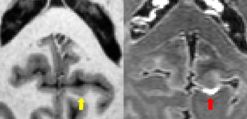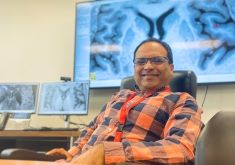2024 News
Federal Funding Exists for J-1 Postdoctoral Fellows
August 29, 2024
Shishir Dahal is excited.
A second-year postdoctoral fellow in the department of neurology at UMSOM and member of the UM Multiple Sclerosis Neuroimaging Biomarker Research Group, Dahal uses the 7.0 Tesla MRI to examine the brain lesions and inflammation associated with multiple sclerosis (MS). While infections have long been thought to contribute to MS, a chronic inflammatory and neurodegenerative condition with no cure, it was only a recent longitudinal study that provided strong evidence supporting the role of Epstein-Barr virus (EBV) infection in increasing one’s risk for MS. Dahal’s goal is to find ways to reduce the burden of viral infections to prevent altogether or minimize the impact of MS.
to contribute to MS, a chronic inflammatory and neurodegenerative condition with no cure, it was only a recent longitudinal study that provided strong evidence supporting the role of Epstein-Barr virus (EBV) infection in increasing one’s risk for MS. Dahal’s goal is to find ways to reduce the burden of viral infections to prevent altogether or minimize the impact of MS.
But this is not why he is excited. He is excited because as a non-US-citizen postdoctoral fellow on a J-1 visa, he recently secured federal funding.
“Whenever I talk to my fellow postdocs similarly on J-1 visas, everyone thinks that funding opportunities are limited to only private sources. Now I will tell everyone: Don’t just focus on private, there are federal opportunities for J-1 holders,” says Dahal.
Working under the mentorship of Daniel Harrison, MD, Dahal is part of a large, multi-year, multi-center North American MS study, so he had no immediate pressure to find additional funding. However, Harrison suggested, as part of Dahal’s postdoctoral training, that assembling a grant application would be a good learning experience. The question then was, where to apply?
Dahal received his medical training in Nepal as a radiologist, then became more interested in imaging technology so he pursued PhD studies in New Zealand. His interest in working with the 7.0 Tesla MRI—brought him to UMSOM. There are only 60 such machines in the world and 30 are in North America. “I was really driven by the technology at first, but now have circled back and am very interested in finding solutions for people with MS, which is a devastating, multifactorial disease,” says Dahal.
Armed with a draft of a grant application written by a previous postdoc that was never funded and knowledge from a handful of CARTI seminars he had attended over the past two years, Shishir went back to CARTI and requested a funding consultation. The resulting list was short, containing only three options, a K99/R00 for which he felt he was not ready, a postdoctoral research fellowship opportunity from the National Multiple Sclerosis Society, and an opportunity from the Department of Defense (DoD) Congressionally Directed Medical Research Programs (CDMRP) seeking research relevant to MS to ultimately lessen its personal and societal impact.
Dahal went to work. With Harrison’s strong support and feedback, “a LOT” of help from the grants office with budgeting and supporting documents, and a letter of support from his department chair, Dahal secured a CDMRP Multiple Sclerosis Research Program Early Investigator Research Award on first attempt. 
“I am so excited. I am also very thankful for Stacie Mendoza and CARTI for their help in identifying this opportunity.”
To request a funding consultation, visit the CARTI website.
Contact
Please visit our CARTI Contact Us page.
